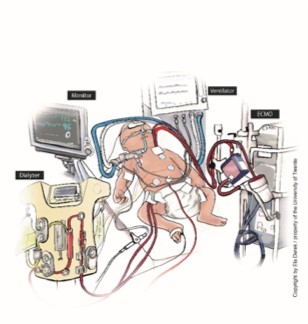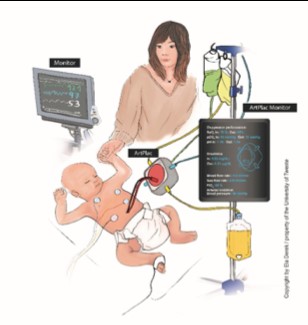CARE, HEALTH AND WELLBEING FOR EVERYONE
STRATEGIC IMPULSE PROGRAM
Prof. Dimitrios Stamatialis is chair of the core team of this strategic impuls program.
Information about this program can be found here: PERSONALIZED RENAL HEALTH
NXTGEN HighTech
AOT participates to large national growth program entitled NXTGEN HighTech. There we participate to the BioMed 4 project aiming to develop pilot production facilities of artificial organs. Within AOT, two PhD students, Marc Torrents and Roberto Nese working on various aspects of the development and production of membranes based dialyzers.
ARTPLAC EU project
Yearly, around two million neonatal deaths occur worldwide. In many cases the deaths occur due to fatal lung failure sometimes combined with kidney failure. Together with partners from academia and industry from the Netherlands, Germany, Sweden, Ireland and Canada, AOT researchers Dimitrios Stamatialis and Lucia Romano aim to develop a novel artificial placenta system, the ArtPlac. To do so, they have been awarded an EIC Pathfinder grant.
In the current intensive care, newborns are faced with highly invasive and high-risk interventions. They are attached to e.g. mechanical ventilation and other medical devices originally developed for adults and downscaled for neonatal care which require several surgically placed lines (Fig. 1A). This makes the intensive care treatment for newborns very stressful, and it can lead to lifelong disabilities. The ArtPlac device will be low-invasive and can be attached to the umbilical cord. “The ArtPlac is a game changer,” says TechMed researcher Jutta Arens, “Current research often tries to just downscale existing medical devices for adults, but newborns are not just small adults, but have very sensitive bodies. Therefore, we will use the natural placenta as a blueprint. Our novel device simply connects to the belly button for lung and kidney support while the baby can breathe, mature, and heal.” This all-in-one device will not only combine lung and kidney support in one device but will also provide the necessary inline monitoring and control, see Fig. 1B.
Fig. 1A: Invasive state-of-the-art setup with respirator, four surgically placed lines, attached extracorporeal lung assist and dialyzer with paralyzed newborn. |
Fig. 1B: ArtPlac – one device attached to the umbilical cord combining lung and kidney support, inline monitoring, and control. |
To develop the ArtPlac, the researchers will work on and apply tailored design approaches and new technologies such as new membranes, microfabrication, microfluidic systems, and sensor technology. All to make the device as small and noninvasive as possible. Several elements of the developed technology could also be used for portable artificial kidneys and lungs for pediatric and adult patients
Advanced biomanufacturing
Although life-saving, dialysis cannot fully replace the kidney function of patients with end-stage kidney disease. The development of portable/wearable artificial kidney (PAK/WAK) and bioartificial kidney (BAK) devices could represent important steps towards better treatment. In this project, AOT researchers, in collaboration with the nephrology department of the UMC Utrecht (Dr K. Gerritsen, Prof M. Verhaar) arefocused on evaluating the functionality of a laboratory-scale artificial and bioartificial kidney systems under clinically relevant conditions.
PERMEDIK COST - EU
AOT participates to this EU COST project which aims to to support the development of a path towards personalized medicine in chronic kidney disease (CKD), based on multidimensional -omics data (Big Data). This Action provides the urgently needed multi-disciplinary communication/dissemination platform bringing together a collation of pan-European expertise, representing diverse scientific fields (nephrology, several –omics areas, bioinformatics, biomarker and drug development), origin (academia, industry, links to policymakers and patient groups) and career levels. The expected impact includes accelerating the introduction of new technologies and therapies for the benefit of CKD patients, hence tackling a major global health problem, guidance for future research in personalized medicine, boosting innovation and European capacities. Even more: educating Early Career Investigators in the exponentially growing area of precision medicine and through the PerMediK ‘inclusive’ mindset, disseminating know-how and tools from centres of excellence to researchers and geographical areas with no regular access to such capacities, promoting European research as a whole.
EuTox
Professor D. Stamatialis is an active member of the EUTox working group of the „European Society of Artificial Organs“ (ESAO). The EUTox working group is composed of twenty six academic and seven industrial members. Its aim is the identification of yet unknown uremic toxins, the characterisation of uremic toxins and the development of new therapeutic approaches for the treatment of chronic kidney diseases. Prof. Stamatialis contributes there to the research axis focussed on innovative technologies for removing a broad range of uremic toxins.


